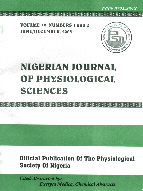
|
Nigerian Journal of Physiological Sciences
Physiological Society of Nigeria
ISSN: 0794-859X
Vol. 24, No. 1, 2009, pp. 63-66
|
 Bioline Code: np09010
Bioline Code: np09010
Full paper language: English
Document type: Research Article
Document available free of charge
|
|
|
Nigerian Journal of Physiological Sciences, Vol. 24, No. 1, 2009, pp. 63-66
| en |
Students Performance And Perception Of Neurophysiology: Feedback For Innovative Curricular Reform In A Nigerian Medical School
Nwobodo, ED; Anyaehie, U. B.; Nwobodo, N.; Awiwa, C.; Ofoegbu, E.; Okonkwo, C.; Aligekwe, C. & Burdick, B.
Abstract
This study aimed at ascertaining the status of students' performances and their perception of the learning of neurophysiology in a Nigerian medical school. The goal of the study was to determine ways of addressing identified negative perceptions for the purpose of improving upon the overall learning and use neurophysiology knowledge by structured curricular reform. We analyzed and compared the performances of students in three areas of physiology at the second professional examinations over a three-year period (n=300). We also surveyed learning experience of a batch of graduating doctors in neurosciences (n=50) and surveyed the staff and students’ perception of the teaching of neurophysiology. The students performances in neurophysiology was comparatively poorer than in cardiovascular and endocrinology aspects of the subject over a three year period at the second professional examinations. The reported students perception of their neurophysiology learning included uninteresting, abstract concepts, lack of real examples and conflicting facts with their prior basic knowledge. Over 50% of the graduands rated their learning experiences as poor or very poor or below average for the neuroscience courses. The analyses of the curricular contents of neurophysiology in the preclinical departments indicted asynchrony and redundancy in topics that may reduce the learning and reduce teaching time efficiency of the neuroscience courses. It is suggested that learning experiences of medical students should be routinely monitored and structured to ensure that the graduate doctor is able to understand and transfer learned experiences into clinical studies and practice. A horizontally integrated curriculum may be one way of raising students knowledge, attitude and skills in neuroscience courses as taught in the preclinical departments and is suggested.
Keywords
Students, horizontal integration, learning experiences, curriculum.
|
| |
© Copyright 2009 - Physiological Society of Nigeria
|
|
